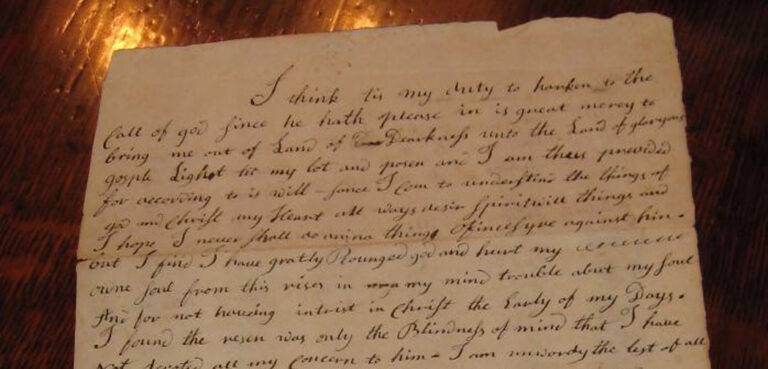Researchers Find Vibrant History in Colonial Church Archives
Church basements, dusty attics provide intimate look at early American history

Your old high school history text may have painted life in colonial America as unfriendly, isolated and harshly ruled, with severe punishments for dissenters and miscreants. But while some of that might be partially true, researchers are finding a richer and more fascinating portrait of life in the country’s early days, in old long-forgotten church documents.
Clues to Early American Colonial Life
Margaret Bendroth, executive director of Boston’s Congregational Library & Archives, and James Fenimore (Jeff) Cooper, professor at Oklahoma State University, are working their way through hundreds of Congregational churches in Massachusetts – some of the country’s oldest churches – unearthing records going back to the 17th century. In them lie important clues to life in colonial America. More than just dusty written accounts of marriages, births and deaths, these fragile, handwritten documents tell vivid stories about individuals’ and communities’ lives.
“These are not just records of the history of American religion in a particular region, not just genealogical information,†says Bendroth, whose library preserves and digitizes Congregational church records to save them. “For many years, the records of the church were the records of the town, everything from baptisms and fornication – lots of that – to ‘Someone let their pigs loose, and they got into my yard.’â€
Hard to Find Early American Documents
The letters, financial accounts, personal testimonies and official church documents that Cooper and Bendroth collect and study are not easy to find. Few churches have kept careful track of their records over hundreds of years. Documents burn up in fires, get lost in attics and even appear on eBay. Sadly, work on collecting these archives is slowed by lack of funding.
“It’s amazing that these fabulous records open a window through which we can explore early American life are just sitting out there in closets, file cabinets and back rooms of churches,” Cooper says. “They’re of great value but inaccessible to historians. They cry out to be rescued.”
Far from being dry and boring stuff, these archival treasures brim with personal triumphs and tragedies, from stirring professions of spiritual journeys to grieving accounts of death and loss. A box labeled “church membership†in one Massachusetts church yielded a cache of personal “relations,†handwritten stories of peoples’ conversions and experiences of grace.
“We were carefully unfolding these and reading them aloud, and realized that this was the first time these words had been spoken,†Bendroth says. “Some were searingly honest, really intimate and very moving.”
A Few Surprises About American Colonial Life
What emerges is sometimes surprising. The beginnings of a very limited American democracy can be seen. Communities were required to have schools. People were expected to be literate. Dissent was actually encouraged, as church members were obliged to voice any opposition to what the minister might be doing. And though the puritans were religiously strict, banishments and excommunications were rare.
“In some ways, you feel a little envious,†Bendroth says. “People really knew each other, and they had this powerful sense of community. You couldn’t survive then without other people in isolation. You get a sense of the power of the relations that bound people together.”
You couldn’t survive then without other people in isolation. You get a sense of the power of the relations that bound people together.”
